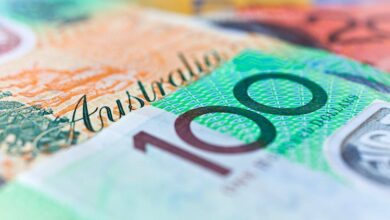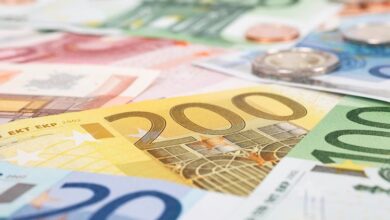Alibaba Stock Earnings News: BABA sinks 6% as growth prospects dim

- Alibaba management approves another $25 billion worth of buybacks.
- BABA trades lower as profits fall from a year ago, revenue growth slows.
- Alibaba stock continues to trade about 75% off its 2020 high of $319.
- Retail sales have slowed nationwide in China as real estate bubble unwinds.
Alibaba (BABA), once the leading light among Chinese stocks owned by foreigners, hit yet another snag on Wednesday. China’s ecommerce leader reported another ho-hum earnings report, this time for the third fiscal quarter ending in December.
BABA stock sank 6% on Wednesday as adjusted earnings per American depository share (EPADS) printed at $2.67. This was slightly higher than consensus but beneath the $2.79 earned one year prior.
Alibaba stock earnings news
Alibaba revenue of $36.67 billion rose a meager 5% YoY and underperformed some consensus estimates while beating others. Management seemed clear-eyed about the once dynamic company’s situation.
“Our top priority is to reignite the growth of our core businesses, e-commerce and cloud computing,” said Alibaba’s new CEO, Eddie Wu. “We will step up investment to improve users’ core experiences to drive growth in Taobao and Tmall Group and strengthen market leadership in the coming year.”
The company is in the process of splitting up into six distinct units, some of which are expected to eventually hold their own IPOs. Two of the most important segments, Cloud Intelligence and the Taobao & Tmall Group, grew their revenue just 3% and 2%, respectively, on an annual basis.
Diluted earnings per ADS, similar to GAAP results, came in at $0.80 in fiscal Q3. This fell from $1.49 in the previous quarter ending in September.
The domestic retail segment grew revenue just 1% YoY, but the much smaller domestic wholesale business saw sales rise 23%. Meanwhile, the International Digital Commerce segment, which manages Lazada, Alibaba.com and AliExpress, posted a 44% increase in annual revenue.
Interestingly, Alibaba’s board signed off on a $25 billion addition to its stock buyback policy, but the market panned the extremely large announcement. That buyback would reduce current shares outstanding by about 12.5%.
NIO FAQs
Nio is a designer and manufacturer of electric vehicles based in Shanghai, China. Formerly known as NextEV, the company changed its name to Nio in 2017. Nio trades under the NIO symbol on the New York Stock Exchange (NYSE) and under the 9866 tag on the Hong Kong Stock Exchange. The company was incorporated in 2014 but went public on the NYSE in September 2020 with a $1.8 billion initial public offering. William (Bin) Li is the CEO of Nio, which he co-founded with President Lihong Qin, another Chinese business executive.
The main difference with other major EV brands like Tesla is that Nio offers battery swapping technology in addition to normal charging options. These swap stations allow drivers to switch out their batteries for fully-charged, identical batteries in less than five minutes, which allows owners to drive long distances without needing to stop for an hour to recharge like most other EVs. At the end of 2022, Nio had 1,305 battery swap locations and built its first swap station in Norway in May 2022. The goal for the customer is to reduce range anxiety.
Nio began its reign with the EP9 sport car back in 2016, and the vehicle is still being produced on a small scale. Since then, Nio has branched off into more mainstream fare. The ES8 was introduced in 2018. It is a full-size SUV with a range of 311 miles. The ES6 SUV dropped the following year and has a range of 379 miles. The smaller EC6 SUV arrived in 2020, and the ET5 and ET7 sedans were released in 2021 – the latter two with versions capable of achieving 621 miles of range. The ES7 and EC7 arrived in 2022 and 2023, respectively.
Yes. While the vast majority of Chinese automakers focus wholly on the Chinese market, Nio began its foray into Europe in late 2021. After beginning in Norway, Nio began entering the German, Danish, Dutch and Swedish markets in 2022 with plans to expand throughout the rest of the decade. Although they are not yet sold in the US, Nio vehicles are being tested in California under that state’s autonomous driving program.
Alibaba stock forecast
Alibaba stock has been trading largely sideways for much of the past two years after its large-scale collapse in 2021. Shareholders have grown used to BABA stock trending in the $60s and $70s, prices it traded at a full decade ago.
The 50-day Simple Moving Average has remained below the 100-day counterpart since October 16 of last year. With the fiscal Q3 result in the bag, there are no near-term catalysts for BABA. Even an extremely generous $25 billion buyback announcement couldn’t whet appetites.
Near-term support might hold at $73.28, a long-term fortification from March 2022. Further down, the $67 level from January might again come to the rescue. Otherwise, bulls may have to wait for entry at $63.40, a level that saw measured respect in October 2022.
BABA daily stock chart
Get Best News and Web Services here







